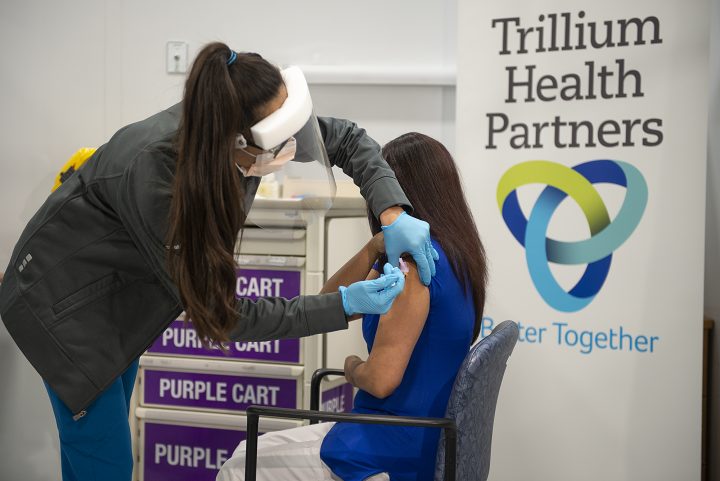Nine months after admitting a first COVID-19 patient at the Credit Valley Hospital in Mississauga, Ont., Nasha Zaheer says it was an “amazing feeling” giving the hard-hit Peel Region’s first coronavirus vaccine shot to a long-term care worker.

“It was really a special moment because I did get to admit the first COVID patient and then now to administer that vaccine,” the 30-year-old Pakistani-Canadian nurse told Global News.
“We’ve come a long way in such a short period of time.”
Earlier this month, Canada started rolling out COVID-19 vaccines from Pfizer-BioNTech across the country, injecting front-line health-care workers, as well as long-term care residents and workers, as part of the high-risk groups being inoculated in the initial stages.
On Wednesday, Health Canada also approved Moderna’s coronavirus vaccine, with its first doses expected to arrive in the coming days.
An eagerly-awaited arrival of the vaccine has brought some relief and optimism for front-line workers, who have been stretched to the limits treating COVID-19 patients for months.
In Toronto, a video shared on Twitter on Wednesday showed health-care workers at the Humber River Hospital dancing and rejoicing the start of vaccinations.
“To say we’re EXCITED to be opening our #COVax clinic today is an understatement. Hopefully this marks the beginning of the end for #COVID19!“ the hospital posted.
Zaheer says she and her colleagues are now looking forward to their turn to get the vaccine, which she described as a “security blanket”.

Get weekly health news
“Since we basically experienced the same things we’ve gone through being the COVID unit and working so closely with positive patients, I think they’re very eager to have this vaccine dispensed and dispersed among all of us just so we can all be safe going into work.”
With hospitals bursting with patients, the pandemic has taken a physical and mental toll on health-care workers and their families across the country.
Globally, thousands of front-line workers have also been infected and have succumbed to the novel coronavirus.
According to a September report by Amnesty International, at least 7,000 health workers are known to have died around the world after contracting COVID-19, with 17 of them in Canada. That number is likely much higher, the rights group said, due to under-reporting.

‘Baby steps’
Besides the stress of caring for sick patients and long hours at work, health-care workers are also faced with concerns about getting infected and taking the virus home to their families.
At the start of the first wave in March, Zaheer moved out of her parent’s house in Brampton along with her younger sister.
“I found out a lot of my colleagues actually ended up doing the same. They all moved out and basically isolated themselves away from loved ones, so we weren’t exposing any other people. “
Bailla Hasan, Zaheer’s 22-year-old sister who works as a server, was forced to relocate for a second time this year and moved out of their Brampton apartment to go live back with their parents because of concerns about a possible risk of catching the virus.
She says it has been a hard year for the whole family, but the vaccine has finally given them some hope.
“It’s definitely a big light for us, especially from what she’s seen and what I’ve heard she’s seen and how families can’t even go into the hospital to see each other right before their last goodbyes,” Hasan told Global News.
“It’s going to be a big change and I’m glad that we’re finally getting somewhere.”
Amid a second wave of the pandemic, hospitals in Ontario, Quebec and Alberta are seeing an influx of COVID-19 patients filling up Intensive Care Unit (ICU) beds.

Dr. Isaac Bogoch, an infectious diseases specialist and physician at Toronto General Hospital, says the vaccine will not solve all the problems of the pandemic, but it will “certainly help to alleviate pressure” on the health care system.
“If we really vaccinate those who are at greatest risk of getting infected and the greatest risk of having a severe outcome requiring … hospitalization, we can take some of the pressures off of the health care system,” he told Global News in an interview last week.
For Zaheer, she is looking forward to the day when she will be able to see and hug her family and friends without the constant fear of putting them at risk.
“I know that’s a very long way away, but we are making our baby steps there and that’s what I’m hopeful for.”










Comments